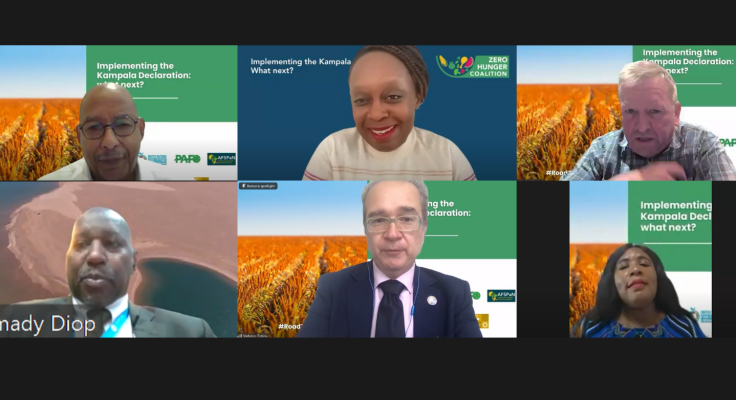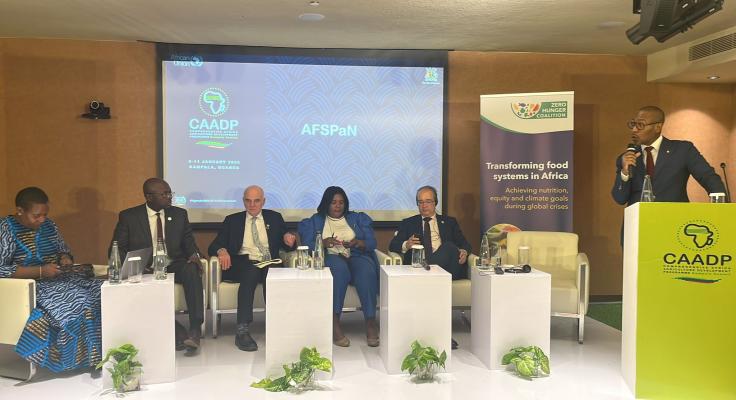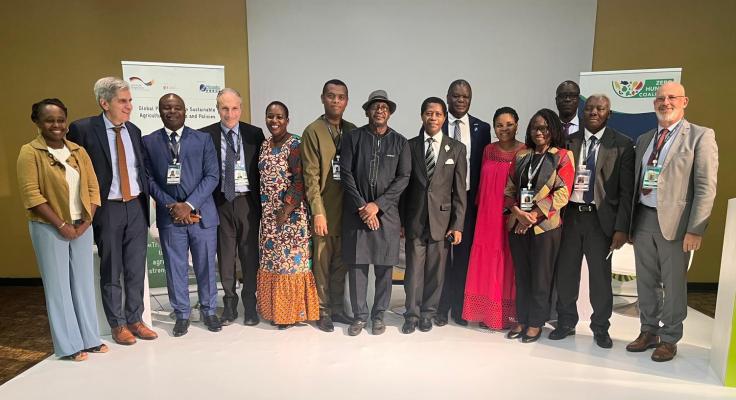
Mission to Madagascar: Day 1
The Zero Hunger Coalition is currently in Madagascar supporting the finalization of the country's Action Plan for the operationalization of its National Roadmap for Food System Transformation. The ZHC is joined by a delegation from Benin and the Democratic Republic of the Congo as part of the Coalition’s platform promoting South-South dialogues.
Participants in this mission include representatives from the United Nations (FAO, UNICEF, WFP, UN mission in Madagascar, food system transformation taskforce members from Benin, the Democratic Republic of the Congo (DRC) and Madagascar, development agencies (GIZ), NGOs (GAIN and the Shamba Centre for Food & Climate) under the aegis of the Ministry of Agriculture and Livestock and the Zero Hunger Coalition
DAY 1 - Official start of the mission: Showcasing African solidarity
A sunny Monday morning in Antananarivo brought participants together to share their insights on how to achieve their common goal: inclusive, resilient and sustainable food systems in their respective countries.
The day began with a warm welcome from Fanja Raharinomena (Ministry of Agriculture and Livestock, Madagascar) who officially opened the session: “This mission reflects a fundamental principle: cooperation is not an option, but a necessity. In the face of the complex challenges of our time—be it food security, climate change, or economic transformations—it is imperative to combine our strengths, pool our knowledge, and unite our determination to achieve concrete and sustainable solutions.”
Ms Raharinomena thanked the ZHC for its work in creating a unique platform for collaboration, bringing together diverse partners to tackle the challenges affecting global food systems.
Accelerating African agrifood transformation

The regional framework guiding the next decade of food system transformation is currently being finalized by the African Union and set to be signed by heads of state in Kampala in early 2025. Hamady Diop, who is helping to shepard this process on behalf of the African Union, provided an update on its objectives and status. He began by a review of the previous plans - the Maputo Declaration (2003) and the Malabo Declaration (2014).
"Unfortunately, he noted, as the Covid-19 crisis has demonstrated, our food systems are not very efficient. There is an urgent need to find ways to accelerate our processes and focus more on developing agriculture for the purposes of achieving food sovereignty, creating jobs, integrating women and youth into the sector, and reducing the heavy cost of food imports.”
This presentation led to an animated discussion. What have been the results of the Malabo Declaration? What has been the involvement of countries in this process? Has there been involvement of ministries other than agriculture? What is the African Union’s budget for implementation?
And as for the answers…Mr Diop noted that strides have been made since the Malabo Declaration. For example, production has increased, however, the population is growing at a faster rate. Inter-continental trade is developing but more work needs to be done. To implement the Kampala Declaration, the African Union will revise its existing monitoring system, the biennial reviews, based on the strategic plan.
Achieving these goals will require resources. As public funds will not be sufficient, Mr Diop highlighted the importance of mobilizing finance from the private sector. However, this will only be possible if favourable investment conditions exist. He concluded by noting that, “Climate and agriculture issues were previously siloed. At the COP this year and last year (in Dubai), these two agenda were brought together. Financing from climate funds should be available to support the implementation of food systems.”
Countries share best practices

The afternoon proceeded with representatives discussing their country experiences.
On behalf of Madagascar, Ms Clara Raherijaona (Ministry of Agriculture and Livestock, focal point for Taskforce) shared that it will introduce an advanced digital tool for monitoring and evaluating the implementation of its national roadmap. This tool will not just be a technical instrument but a strategic lever to optimize priorities, streamline interventions, and maximize the impact of actions on the ground.
On behalf of Benin, Mr Dominique Dedegbe (Ministry of Agriculture) provided an update on the recent approval of the national dialogue on food systems transformation. This process brought together 40 organizations to determine the priorities in the National Roadmap that will be developed with the support of the Zero Hunger Coalition.
With the support of GAIN and the Coalition, the country has been able to put in place its national taskforce for food system transformation. Following the lead of Madagascar, It hopes to implement a platform with indicators to follow implementation.
In the DRC, Alain Boya (Ministry of Agriculture, focal point for the Taskforce) noted that the country is currently seeking official support to implement its national roadmap that will integrate agriculture, nutrition and sustainability. While the national taskforce is not yet officially in place, informal meetings are underway.
However, the country is plagued by war along its eastern borders. While it once had major livestock production, the war has brought an end to this industry. Local production remains weak and the country relies on food imports.
As Day 1 concluded - well past the scheduled time given the discussions that took place - Ms Raharinomena called on participants to ensure that the South-South cooperation is not just a theoretical concept but a real catalyst for progress. “The success of this initiative could become a benchmark for other regions of the world, showing how Africa can establish itself as a model of resilience and innovation in transforming agri-food systems,” Ms Raharinomena noted.



